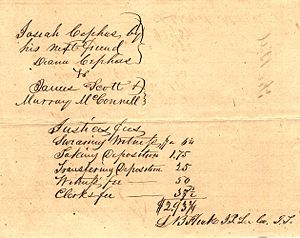Diana Cephas facts for kids
Diana Cephas was a brave woman who fought for her freedom from slavery. She filed a special court case called a freedom suit in St. Louis, Missouri, in 1840. She won her case in 1843 after it went to trial. Diana was born into slavery in Maryland. She and her young son, Josiah, were taken to the free state of Illinois in 1839. A "free state" was a place where slavery was not allowed. She was then taken to Missouri, which was a "slave state" where slavery was legal. Diana won her freedom with the help of her lawyer, Francis B. Murdoch.
Her Early Life
Diana and her son Josiah were both born into slavery in Maryland. Josiah was born in April 1838.
In 1839, a man named Mark Delahay, who claimed to own them, took Diana and Josiah to the free state of Illinois. Delahay settled in Naples, Illinois, in July 1839. He rented Diana out to work for several months and collected her wages. In August 1839, Mrs. Delahay died. Six months later, Mark Delahay left Illinois, leaving Diana and Josiah behind.
In February 1840, a man named Murray McConnell took Diana and Josiah. Diana said McConnell forced them onto a steamboat to St. Louis. She said he held her and her son as slaves there. Mark Delahay later claimed he had sold Diana and Josiah to McConnell for $1,100.
Fighting for Freedom in Court
On October 22, 1840, lawyer Francis B. Murdoch filed two lawsuits for Diana Cephas and two-year-old Josiah. The judge quickly gave them permission to sue. A second set of lawsuits was filed for Diana in 1841. However, her case did not go to trial until September 18, 1843. Sadly, Josiah died on July 19, 1842, about a year before the trial.
Only Diana's case moved forward. McConnell's lawyers tried to argue that Diana was a runaway slave. They claimed she had run away to Illinois. If she was a runaway, they could argue she had to be returned to her owner under the Federal Fugitive Slave Law.
Despite these arguments, Diana won her freedom. Her victory was based on a legal idea called "once free, always free." This idea was set by a case called Winny v. Whitesides in 1824. It meant that if an enslaved person was taken to a free area to live or work with their owner's permission, they could sue for their freedom. This was true even if they were later taken back to a place where slavery was allowed.
Diana Cephas won her court case soon after Polly Wash and Lucy Berry also won their freedom suits in St. Louis. Roswell Field, one of the lawyers who tried to stop Diana, later represented Dred Scott in his famous freedom suit.
 | Roy Wilkins |
 | John Lewis |
 | Linda Carol Brown |


